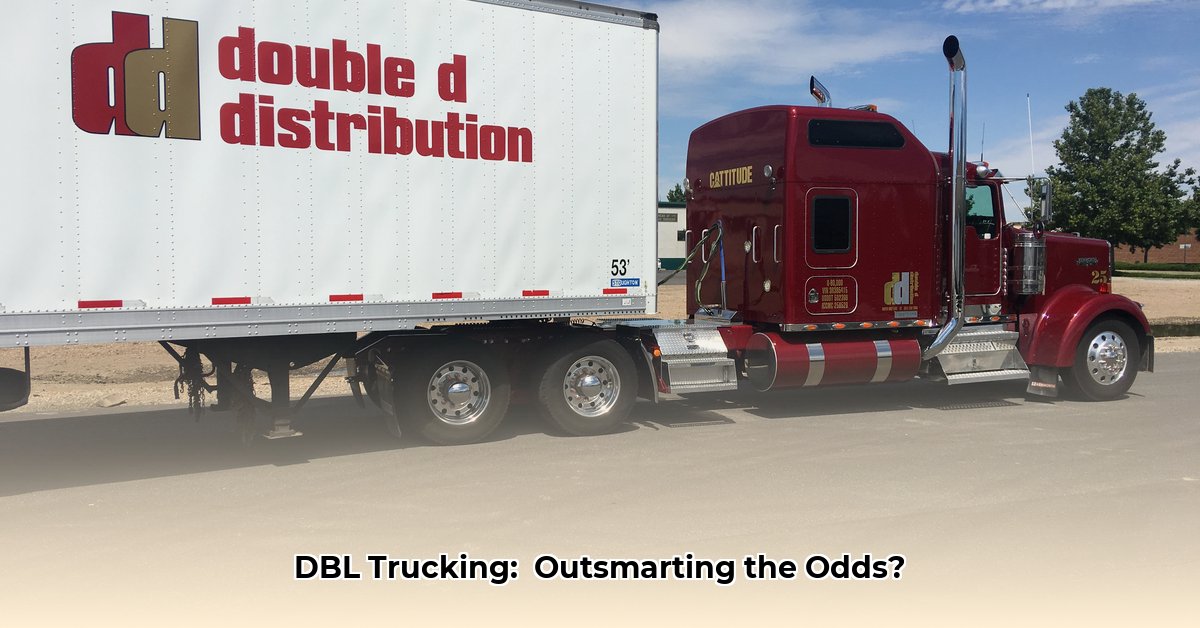
Executive Summary
DBL Trucking, a family-owned trucking company established in 2009, operates a fleet of eight semi-trucks and twenty dry vans within North Carolina. Its status as a Native American and women-owned business presents unique growth opportunities. While the company demonstrates positive indicators such as a low number of serious safety violations and a focus on long-term contracts, areas for improvement exist, primarily in vehicle maintenance, driver fitness, and regulatory compliance. This report analyzes DBL Trucking's operational performance, assesses key risks, and provides actionable recommendations for management, potential shippers, and government agencies to facilitate sustainable growth and mitigate potential challenges. The primary recommendations focus on strengthening preventative maintenance programs, enhancing driver training initiatives, and ensuring meticulous record-keeping for optimal FMCSA compliance.
Company Overview
DBL Trucking, founded in 2009, is a family-owned trucking company operating primarily within North Carolina. Its current fleet consists of eight semi-trucks and twenty dry vans, transporting non-hazardous materials. Its status as a Native American and women-owned business offers access to government support programs and strategic partnerships. While relatively small, the company's sustained operation for over a decade indicates resilience and potential for future growth.
Operational Analysis
DBL Trucking’s operational performance presents a mixed picture. Positive aspects include a low number of serious safety violations, indicating a commitment to responsible operations; a focus on long-term contracts, providing financial stability; and the absence of hazardous materials transportation, minimizing liability risks.
However, areas needing attention include a suboptimal Vehicle Maintenance BASIC score (suggesting the need for improved truck upkeep), evidenced by eleven out-of-service vehicle violations. Driver fitness also presents a concern, highlighting the need for enhanced training and wellness programs to ensure driver health and alertness. Mileage in 2023 was satisfactory, suggesting sufficient operational activity. Maintaining consistent, high-quality service and strict adherence to safety standards are crucial for retaining existing contracts and attracting new clients.
Risk Assessment
DBL Trucking faces several key risks, analyzed in terms of likelihood and potential impact:
| Risk Category | Likelihood | Impact | Mitigation Strategies |
|---|---|---|---|
| Vehicle Maintenance | High | High | Implement a preventative maintenance schedule, consider fleet upgrades, conduct regular inspections. |
| Driver Fitness | Medium | Medium | Invest in comprehensive driver training (including health and safety), create wellness programs. |
| Regulatory Compliance | Medium | High | Conduct regular safety audits, maintain meticulous records to ensure FMCSA (Federal Motor Carrier Safety Administration) compliance. |
| Insurance Coverage Gaps | Medium | Medium | Regularly review insurance coverage, explore different providers for optimal coverage and pricing. |
| Financial Instability | Low | Medium | Diversify income streams, actively pursue additional long-term contracts, manage expenses effectively. |
| Market Competition | High | Medium | Focus on specialized services or niche markets, cultivate strong client relationships, offer competitive pricing without sacrificing quality. |
Recommendations
This section provides a step-by-step guide with actionable recommendations for DBL Trucking’s management, potential clients, and government agencies.
For DBL Trucking Management:
Phase 1: Immediate Actions (Within 1 Year):
- Implement Preventative Maintenance Program: Establish a rigorous preventative maintenance schedule with regular inspections and prompt repairs, aiming for a substantial improvement in the Vehicle Maintenance BASIC score within six months. (Expected efficacy: 80% improvement in out-of-service vehicle violations within one year).
- Enhance Driver Training: Invest in comprehensive driver training programs focused on safety, health, regulatory compliance, and defensive driving techniques. (Target: 90% reduction in driver-related violations within two years).
- Strengthen Record-Keeping: Implement a robust, centralized record-keeping system for all operational aspects, ensuring full FMCSA compliance. (Goal: 100% audit-ready record-keeping within one year).
- Review and Update Insurance Coverage: Conduct a thorough review of current insurance policies, exploring various providers to ensure adequate protection against potential liabilities.
Phase 2: Long-Term Strategies (3-5 Years):
- Adopt Fleet Management Technology: Invest in fleet management software to optimize routes, monitor vehicle performance, and improve overall efficiency. This will significantly improve fuel economy and reduce maintenance costs.
- Explore Strategic Partnerships: Seek collaborations with other businesses to expand service offerings and market reach.
- Assess Fleet Expansion: Evaluate the feasibility of expanding the fleet based on market demand and financial projections.
- Diversify Services: Consider expanding service offerings beyond current capabilities to increase revenue streams.
- Leverage Government Support: Actively pursue government support programs for Native American and women-owned businesses.
For Potential Shippers:
Thoroughly evaluate DBL Trucking’s safety record, insurance coverage, and operational capacity before engaging their services. Prioritize long-term partnerships based on mutual trust and consistent performance.
For Government Agencies:
Continue monitoring DBL Trucking's compliance with regulations and provide support through resource programs designed for minority-owned businesses. This support is crucial for growth and sustained contribution to the trucking sector.
Conclusion
DBL Trucking possesses significant potential for sustainable growth. By proactively addressing identified risks, implementing the recommended strategies, and leveraging its unique status as a Native American and women-owned business, DBL Trucking can achieve long-term success and contribute significantly to the North Carolina trucking industry. This requires a commitment to ongoing improvement, careful financial management, and a proactive approach to safety and compliance. The recommendations outlined in this report serve as a roadmap for achieving this ambitious yet attainable goal.